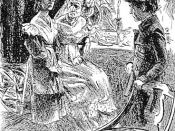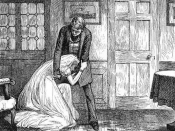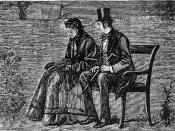In Great Expectations, Charles Dickens explores the popular attitudes of his contemporary readership towards social welfare and the treatment of the poor. He does this by setting the book in a time before certain social reforms, reforms Dickens thought inhuman, had been implemented. Great Expectations was published serially in 1860 and 1861. The time period the story encompasses was from 1812 to 1829. It is important to note that the period between these fictional events and the book's publishing was one of social upheaval in Victorian England. Most notably, in 1834, legislation known as "The New Poor Laws" went into effect. (A History of Western Society-source)
The brutal treatment Pip receives at the hands of adults is deeply troubling. Not a day seems to pass in which he is not threatened, verbally demeaned, or physically injured in the name of parental supervision or propriety. Popular opinion in Dickens's time viewed poverty as a moral judgment.
Those in need of charity were in need not only of alms but, more importantly, of correction. Poverty was a judgment from God upon the wicked, and the wicked deserved the harsh treatment which accompanied charity, as a reminder of their imperfection. We see in this outlook a parallel in the way Pip is viewed by his elders. The treatment Pip experiences as a child reflects in attitude, as inaction, the position of the larger society toward those dependent upon it for survival. Mrs. Joe, among other adults, is to Pip what social perception was to the poor.
Pip is reminded often by Mrs. Joe that he has been "raised by hand" .This is a point of pride for Mrs. Joe. It is quite another thing to Pip. Knowing her to have a "hard and heavy hand, and to be much in this habit...


